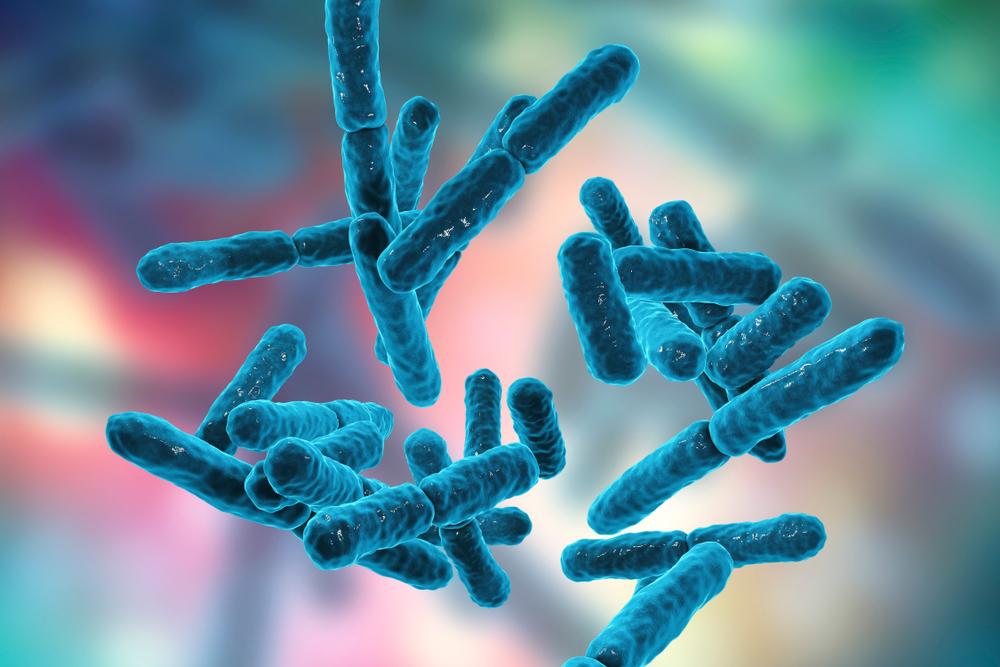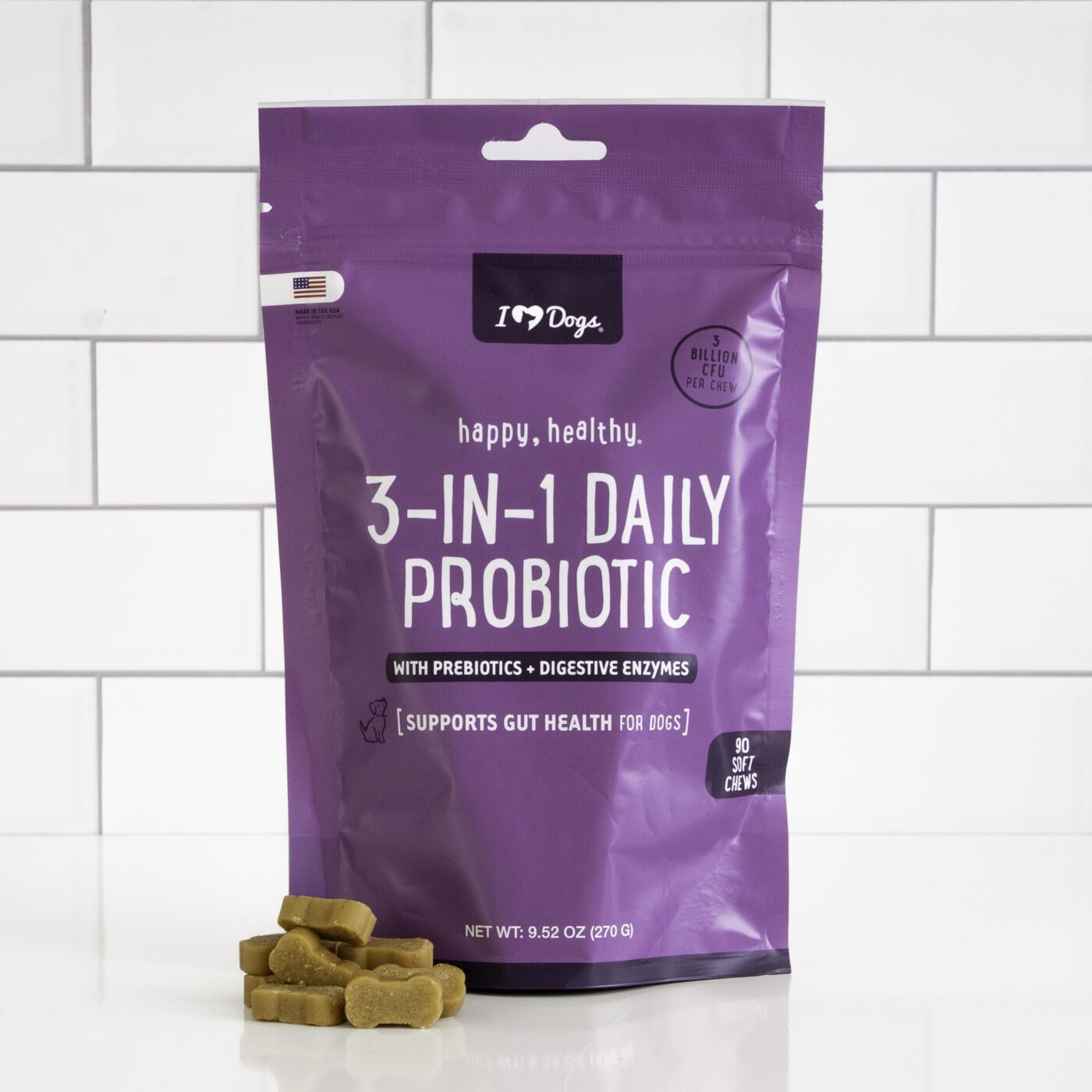
Dog Probiotics For Allergies
Probiotics have exploded in popularity in recent years. In fact, a survey done by the NIH shows that they’re now the 3rd most popular natural supplement taken by people.
Related: 12 Best Dog Probiotics
While most people and pets are first given probiotics for digestive reasons, recent human and animal studies have begun to show promise in use with patients suffering from allergies. Let’s review some of the evidence to-date:
What Do The Studies Say About Probiotics For Dogs?
- A 2017 study by the University of Florida showed that participants given a probiotic suffered from fewer allergy-related symptoms during an 8 week experiment. [1] While most studies involve humans, not animals, there is a small but growing amount of research specific to dogs.
- A 2012 study published in the Journal of Veterinary Immunology and Immunopathology showed that the probiotic strain Lactobacillus rhamnosus significantly decreased allergen-specific Immunoglobulin E (IgE), which is an antibody released by the immune system in response to an allergen, and partially prevents clinical signs developing over a follow-up period of three years. [2]
- A 2015 Double-Blind, Placebo Controlled-Trial published by the NIH showed that the probiotic strain Lactobacillus sakei given for 2 months significantly reduced the disease severity of dogs diagnosed with canine atopic dermatitis. [3]
While the need for more research is certain, the results so far are very promising.
What Do Veterinarians Say About Probiotics For Dog Allegies?

Dr. Angie Krause reminds us that, “While probiotics don’t directly stop your dog from scratching, they do promote gastrointestinal health. Having a good population of healthy bacteria in the gut of your dog can drastically reduce and prevent allergies.”
Dr. Kathryn Primm advises, “Probiotics may hold promise in improving health for our beloved dogs, but be a savvy consumer. If it sounds too good to be true, it probably is and ALWAYS ask your own vet for advice on anything you feed your pets.”
Can Prebiotics & Digestive Enzymes For Dogs Also Help Allergies?
Prebiotics are a crucial part of a successful probiotic routine, as this type of fiber is the food that “good bacteria” probiotics feed on. A good canine probiotic formula should also include prebiotics.
Digestive enzymes are also an interesting component to healthy immune response. Human studies are starting to reveal that properly and fully digesting food may play an important in allergy response. Some canine probiotics, such as Pronine™ Flora, contain digestive enzymes as well.
To summarize the studies above, the results for alleviating canine allergic response are promising, but not yet conclusive. Considering the chance of an adverse reaction to giving your dog a probiotic is very low, probiotics are a worthy tool in your arsenal for fighting canine allergies.
Please visit here if you’d like to learn more about the dog probiotic chews recommended by iHeartDogs.
Frequently Asked Questions:
Probiotics are live microorganisms with numerous health benefits for dogs, including improved digestion, immune function, and skin health. Recently, some research has advocated using probiotics to help with dogs’ allergy-related symptoms with some success. While the exact mechanism behind how probiotics work to alleviate allergy itching is not yet fully understood, studies have shown promising results. Find out more to know if probiotics are the right choice for your dog’s allergies.
Which Probiotic Is Best For Dog Allergies?
Veterinarians commonly recommend the probiotics Lactobacillus acidophilus for dogs with allergies. This bacterial strain has been shown to reduce inflammation and improve immune function in dogs, which can help alleviate allergy symptoms. Another beneficial bacterial strain for dogs with allergies is Bifidobacterium lactis, which can also reduce skin inflammation and improve overall skin health in dogs.
Other beneficial bacterial strains to look for in a probiotic for dogs with allergies include Lactobacillus rhamnosus, Enterococcus faecium, and Streptococcus thermophilus, among others. Try to choose a high-quality probiotic that contains live, viable bacterial cultures and has been specially formulated for dogs. Look for a product that has been third-party tested for purity and potency, and always follow the dosage instructions carefully.
Ultimately, the best probiotic for your dog’s allergies will depend on their individual health needs and the specific type and severity of their allergy symptoms. Consult with your veterinarian or a certified animal nutritionist for personalized advice on choosing the best probiotic for your dog.
Do Probiotics Really Help Dog Allergies?
Probiotics have shown promising results in helping to alleviate allergy-related itching and other symptoms in dogs. Studies have shown that probiotics can help improve immune function, reduce inflammation, and enhance the skin barrier to alleviate the symptoms of allergic skin conditions. Overall they can reduce the severity of allergic dermatitis symptoms and improve overall skin health.
Another study published in the Journal of Nutrition found that supplementing dogs with a probiotic containing Lactobacillus rhamnosus and Bifidobacterium animalis improved skin barrier function and reduced the severity of itching and scratching associated with allergies.
While probiotics may not work for every dog with allergies, they can be a safe and effective treatment option for many dogs. It’s important to note that probiotics are not a substitute for proper veterinary care and should be used as part of a comprehensive treatment plan for allergic skin conditions.
Will A Probiotic Help My Dog Stop Itching?
Probiotics may help your dog stop itching if the itch comes from allergies. However, probiotics cannot help with all forms of itching, such as anxiety, food allergy, dermatitis, fleas, and other issues that can cause dog itching. Always determine the underlying cause before selecting a treatment for the most efficiency. That being said, probiotics can be a safe and helpful addition to your dog’s diet as they can help with many other aspects of health.
How Long Does It Take For Probiotics To Work In Dogs With Allergies?
The time it takes for probiotics to work in dogs with allergies can vary depending on the severity of the allergy symptoms and the specific probiotic product being used. In general, it can take several weeks to several months of consistent use to see a noticeable improvement in allergy-related symptoms. Unfortunately, probiotics are not a quick fix for allergy symptoms but instead a part of a comprehensive treatment plan for allergies.
Is Pumpkin A Probiotic For Dogs?
While pumpkin is not a probiotic for dogs, it does contain beneficial nutrients that can support digestive health in dogs. Pumpkin serves as a good source of dietary fiber, which can help promote regular bowel movements and support healthy digestion. In addition to fiber, pumpkin contains a variety of vitamins and minerals, including beta-carotene, vitamin C, and potassium, that can help support overall health and immune function in dogs.
Should I Give My Dog Probiotics Every Day?
Probiotics are perfectly safe for dogs even on a daily basis and can promote inflammation reduction, digestive conditions, and many other health concerns. However, it’s important to follow the dosage instructions carefully and to choose a high-quality probiotic product that has been specially formulated for dogs. On the other hand, if your dog is generally healthy and has no specific digestive concerns, you may choose to give them probiotics less frequently, such as after antibiotics.
What Do Vets Say About Probiotics For Dogs?
Probiotics for dogs have gained popularity in recent years as a way to promote digestive health and immune function. Many veterinarians recognize the potential benefits of probiotics for dogs, and some may recommend their use in certain situations. Furthermore, most vets agree to give dogs probiotics after antibiotics for diarrhea and inflammatory bowel disease.
What Really Works For Dogs Allergies?
The most effective treatment for dog allergies depends on the specific type of allergy your dog is experiencing. Some common types of dog allergies include food allergies, environmental allergies (such as pollen or dust mites), and flea allergies. While some forms of allergies respond to medications, others will respond to topical treatments. Also, some dogs need to get allergy shots to cope with allergies. No one treatment will work best for every dog.
What Can Get Rid Of Dog Allergies?
Unfortunately, there is no cure for dog allergies. However, there are several strategies that can help manage and reduce allergy symptoms in dogs. Some dogs will need to combine therapies to see a difference. Treatment options include:
Identifying and avoiding the allergens
Antihistamines
Topical treatments
Immunotherapy
Probiotics
Omega fatty acid supplements
Dietary changes
Environmental changes
How Do I Get My Dog To Stop Itching And Itching?
If your dog is itching and scratching excessively, you need to determine the underlying cause and address it appropriately. Start with a visit to your veterinarian to determine the cause. They may recommend the options above to help combat allergies. Also, you can try using flea preventatives and oils for dog skin or baths.
What Can I Use For My Dog That Keeps Itching?
If your dog is constantly itching, scratching, or biting at their skin, there are a few things you can do to provide relief. Some dogs respond well to Epsom salt baths or magnesium spray but under veterinarian guidance. However, avoiding allergens prevents the problems best. For dogs with severe allergies, consider cleaning more often and using an air purifier, and limiting time outdoors in allergens.
Next, consider bathing your dog in Epsom or Dead Sea Salt, as they are high in trace minerals and can reduce the effects as a natural barrier. Lotions can help as well, especially all-natural options like shea butter or coconut oil. Avoid products with fragrance, alcohol, and other irritating ingredients that can worsen the problem.
How Long Should A Dog Stay On Probiotics?
The length of time a dog should stay on probiotics will depend on the individual dog’s health status and the reason for giving the probiotics. In general, it’s safe for dogs to take probiotics for an extended period of time as long as they are being monitored by a veterinarian. Long-term probiotics can support a healthy gut microbiome and immune function in dogs with chronic digestive or immune system disorders. Typically, probiotics should be given for at least a few weeks to allow enough time for the beneficial bacteria to colonize the gut.
Is It Better To Give A Dog A Probiotic In The Morning Or The Evening
You can give your dog probiotics at any time of day as they are not time sensitive. In general, it’s best to follow the instructions provided by the manufacturer or your veterinarian regarding the recommended dosage and timing of administration. Some owners prefer to give probiotics to their dogs in the morning, as it can help support digestive health and nutrient absorption throughout the day. Others prefer to give probiotics in the evening, as this may help support the dog’s natural circadian rhythm and promote healthy sleep.
Sources & Citations
- Dennis-Wall J, Culpepper T, Nieves, Jr. C, et al. (2017). Probiotics (Lactobacillus gasseri KS-13, Bifidobacterium bifidum G9-1, and Bifidobacterium longum MM-2) improve rhinoconjunctivitis-specific quality of life in individuals with seasonal allergies: a double-blind, placebo-controlled, randomized trial 105(3)
- Marsella R, Santoro D and Ahrens K (2012). Early exposure to probiotics in a canine model of atopic dermatitis has long-term clinical and immunological effects, Journal of Veterinary Immunology and Immunopathology 146(2): 185-189.
- Kim H, Rther IA, Kim H, et al. (2015) A Double-Blind, Placebo Controlled-Trial of a Probiotic Strain Lactobacillus sakei Probio-65 for the Prevention of Canine Atopic Dermatitis, J Microbiol Biotechnol. 25(11): 1966-69.

 Toledo, United States.
Toledo, United States.